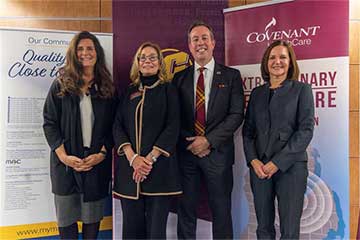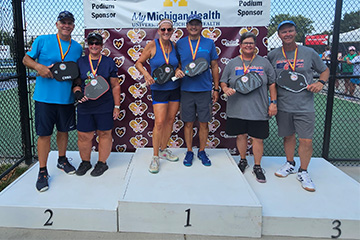Protecting your respiratory health over the holidays
Common questions answered by CMU infectious disease specialist Nicholas Haddad, M.D.
The winter holidays bring a variety of factors that could put your respiratory health at risk. Colder weather, crowded indoor gatherings and the return of seasonal viruses can increase exposure to illness and exacerbate respiratory conditions like asthma or chronic obstructive pulmonary disease (COPD). Additionally, stress and travel can weaken the immune system and make you more susceptible to respiratory infections like colds, flu and COVID-19.
Nicholas Haddad, M.D., who specializes in internal medicine and infectious disease at the CMU College of Medicine shared his expertise on staying healthy this holiday season.
Q: How can I protect my respiratory health this holiday season?
The most common respiratory infections are caused by viruses, which are easy to transmit. The best ways to prevent a viral infection is by boosting immunity and avoiding exposure.
You can get your immune system primed to fight exposure with vaccines which reduce the risk of getting sick if you are exposed and reduce the severity of the symptoms if you do become ill after exposure. Those who are at high-risk for respiratory illness, such as young children, older individuals and immune-compromised patients should get their seasonal vaccines every year to best protect themselves.
You should also work to prevent illness by avoiding exposure. If you are experiencing symptoms of respiratory illness such as coughing, sneezing, runny nose, chest pain or fever, you should stay home and avoid gatherings. It is also important to wash your hands often and avoid touching your face. If you are feeling sick or will be in close contact with strangers who may be sick, you should consider wearing a mask which significantly reduces the risk of viral transmission.
Q: What are the symptoms of respiratory illness that I need to watch for?
Many respiratory infections have overlapping symptoms. Upper respiratory symptoms affect the airways and include sinus congestion, nasal congestion or runny nose, tearing eyes, sneezing and coughing. Lower respiratory symptoms affect the lungs and can include chest pain, a cough that produces sputum, muscle aches and often fever.
Q: What vaccines are recommended this year?
The Flu vaccine is recommended for everyone, including pregnant women who will pass the antibodies to their child which can keep the infant protected for the first 6 months of life. The COVID vaccine is also recommended for everyone and is given as two inoculations 6 months apart. The RSV vaccine is also available and recommended for pregnant women who are 32-36 weeks into gestation. The RSV vaccine is also highly recommended for everyone over 75 years of age and for those over 60 years of age who have additional risk factors such as lung disease, heart disease or other immune compromising conditions. Those with lung or heart disease, diabetes and those who smoke or vape should also consider receiving the pneumococcal vaccine to protect against the bacterium streptococcus pneumonia which can cause pneumonia, meningitis and sepsis. This vaccine is given as a one-time dose, not yearly.
Q: Should I still be testing for COVID prior to visiting with friends and family?
If you are visiting those at high risk for respiratory illness, such as older individuals, very young persons, or anyone who may be immuno-compromised, it is a good idea to take a COVID test prior to your visit.
Q: What precautions do I need to take if I am hosting a holiday party this year?
Start with yourself and make sure you and those in your household are healthy. Remind your friends and family to stay home if they are sick. If your guest list includes immuno-compromised or otherwise high-risk individuals, consider asking people to take a COVID test before arriving and offer masks to those who want one. After the party, open the windows for a short time to circulate fresh air and provide good ventilation. Remember that home COVID tests are available free of charge HERE.
Q: What things can I do to care for my health while traveling for the holidays?
This year, the CDC has no formal travel guidelines in place. It is still suggested that you maintain distance when you can and when in crowds with strangers, it is wise to wear a mask. When traveling by plane, the HEPA-filtered air keeps people relatively safe, but you should consider wearing a mask if someone near you is exhibiting symptoms.
Q: If I do get sick, when should I seek professional medical treatment?
You should seek emergency treatment for serious symptoms such as an ongoing fever, severe shortness of breath or worsening chest pain. You should make an appointment with your primary care provider for mild but persistent symptoms such as a cough that doesn’t go away or general malaise without improvement.
Nicholas Haddad is a faculty member at the CMU College of Medicine. He received his medical degree from the American University of Beirut, completed his residency training at the Indiana University School of Medicine and did a fellowship in infectious disease at Washington University.




